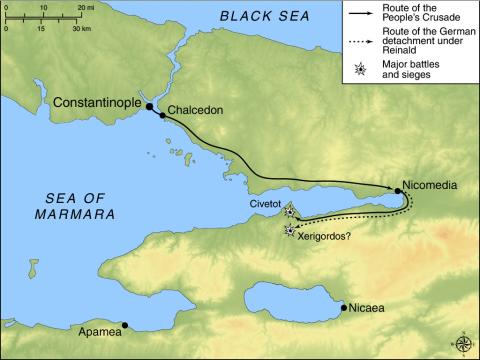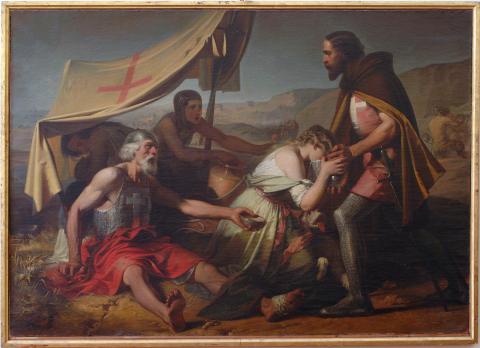The People's Crusade
[1.2.4] Quod cōnfestim Turcī obsēdērunt, eīsque aquam abstulērunt. Fuēruntque nostrī in tantā afflīctiōne sitis, ut flebotomārent suōs equōs et asinōs, quōrum sanguinem bibēbant. Aliī mittēbant zōnās atque panniculōs in piscīnam, et inde exprimēbant aquam in ōs suum. Aliī mingēbant in pugillō alterīus, et bibēbant. Aliī fodiēbant hūmidam terram, et supīnābant sē, terramque sternēbant super pectora sua, prō nimiā āriditāte sītis. Epīscopī vērō et presbitērī cōnfortābant nostrōs et commonēbant nē dēficerent. Haec trībulātiō fuit per octo diēs. Dēnique dominus Alamannōrum concordātus est cum Turcīs, ut trāderet sociōs illīs, et, fingēns sē exīre ad bellum, fugit ad illōs et multī cum eō. Illī autem quī Deum negāre nōluērunt, capitālem sententiam suscēpērunt. Aliōs quōs cēpērunt vīvōs adinvicem dīvīsērunt quasi ovēs. Aliōs mīsērunt ad signum et sagittābant eōs; aliōs vēndēbant et dōnābant quasi animālia. Quīdam condūcēbant suōs in domum suam: aliōs in Chorosānum, aliōs in Antiochīam, aliōs in Aleph, aut ubi ipsī manēbant. Istī prīmō fēlīx accēpērunt martyrium prō nōmine Dominī Iēsū.
notes
vocabulary
ML usages common in the Gesta Francorum
cōnfestim: immediately
zōna –ae, f.: belt, girdle
panniculus –ī, m.: rag
piscīna –ae, f.: fishpond (CL); sewer, cistern (ML)
mingō mingere mīnxī (mīxī) mīnctum (mīctum): to urinate
pugillus –ī, m.: a fistful
fodi foder fōdī fossum: (to pierce, prick); to dig up (OLD 4a)
sternō (3): to spread
pectus pectoris, n.: breast, chest (can be plural even for a single person)
concordō (1): to bring about a harmonious relationship (OLD 3)
ovis ovis, f.: sheep
fēlix fēlicis: happy, fortunate, good (CL); blessed (ML)


